
Breaking the Silence
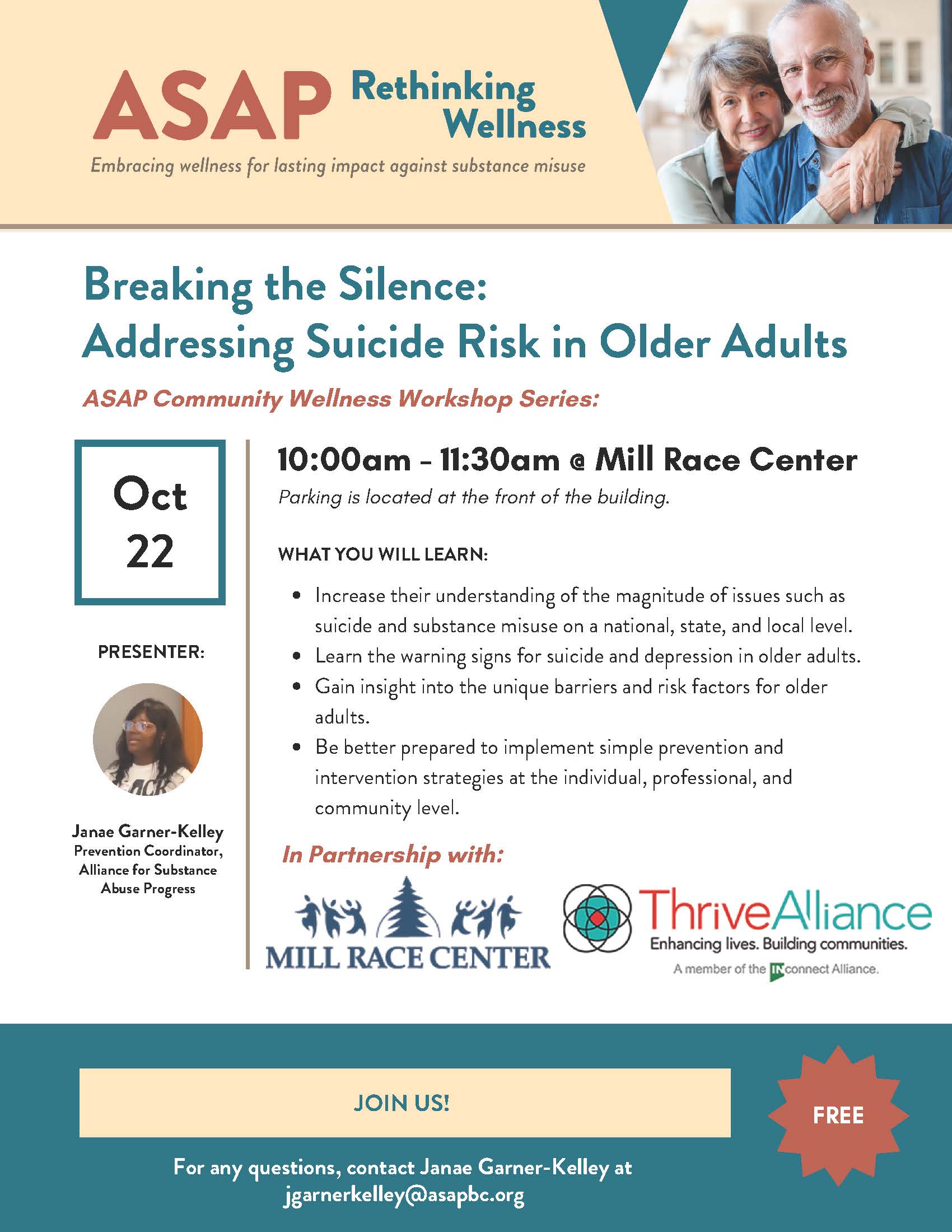
Thrive Alliance donates robotic pets to Our Hospice dementia patients
From Local News Digital: https://www.localnewsdigital.com/2024/08/13/our-hospice-receives-donation-of-robotic-pets-and-music-memory-kit-enhancing-care-for-dementia-patients/
Thrive Alliance donates robotic pets to Our Hospice dementia patients
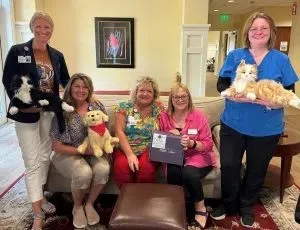
Courtesy-Our Hospice/Thrive Alliance
COLUMBUS, Ind. – Our Hospice of South Central Indiana has announced that it has received a generous donation from Thrive Alliance that will significantly improve the quality of life for dementia patients.
The donation includes several lifelike robotic animals designed to provide sensory-based stimulation and comfort to patients experiencing dementia. The innovative pets calm patients, encouraging them to smile, hug, and stroke the robotic animal’s fur. The tactile stimulation and realistic movements, like purring and meowing, offer a sense of companionship and entertainment.
President of Our Hospice Steph Cain said, “These robotic animals will make the transition from home to our care center much smoother. They not only provide comfort but also act as a catalyst for social connection, sparking positive interactions with staff, visitors, and fellow patients.”
Our Hospice, a certified Music and Memory organization, also received a Music and Memory kit that includes a portable MP3 player, headphones, and a speaker, allowing personalized playlists filled with music from the patients’ preferred genres.
“Familiar music has a profound impact on dementia patients,” explains Dr. Leigh Anderson, Medical Director at Our Hospice. “It can soothe agitation, reduce anxiety, and promote a sense of calmness. Music transcends communication barriers, fostering connection and a sense of belonging.”
Donations like this allow Our Hospice to implement innovative therapies and create a more dementia-friendly environment. “We are incredibly grateful to Thrive Alliance for their generous donation,” says Cain. “These gifts will allow us to better meet the needs of our dementia patients.”
New Powerful Tools for Caregivers Course Being Offered in Seymour
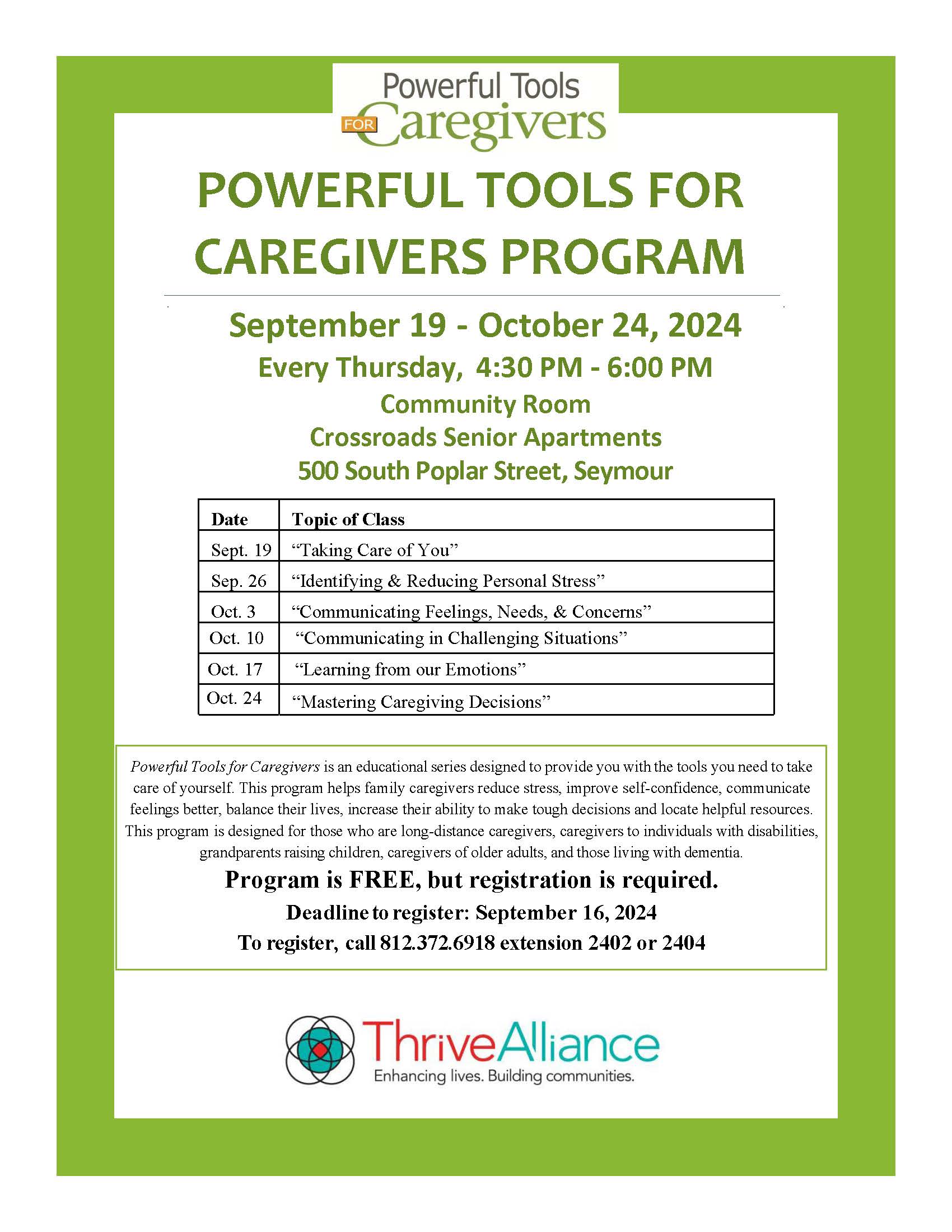
August Caregiver Connection
The August edition of Caregiver Connection is at this link: August 2024 Caregiver Connection
Coordinating Care With Thrive Alliance Seminar Being Offered
Coordinating Care with Thrive Alliance, a seminar for staff of Physician’s Offices, Discharge Planners, Care Managers, In-Home Service Providers, Health Insurance Care Planners and Hospital / Nursing Home Providers.
Register at: https://thrivealliance.salsalabs.org/coordinatingcarewiththrivealliance/index.html
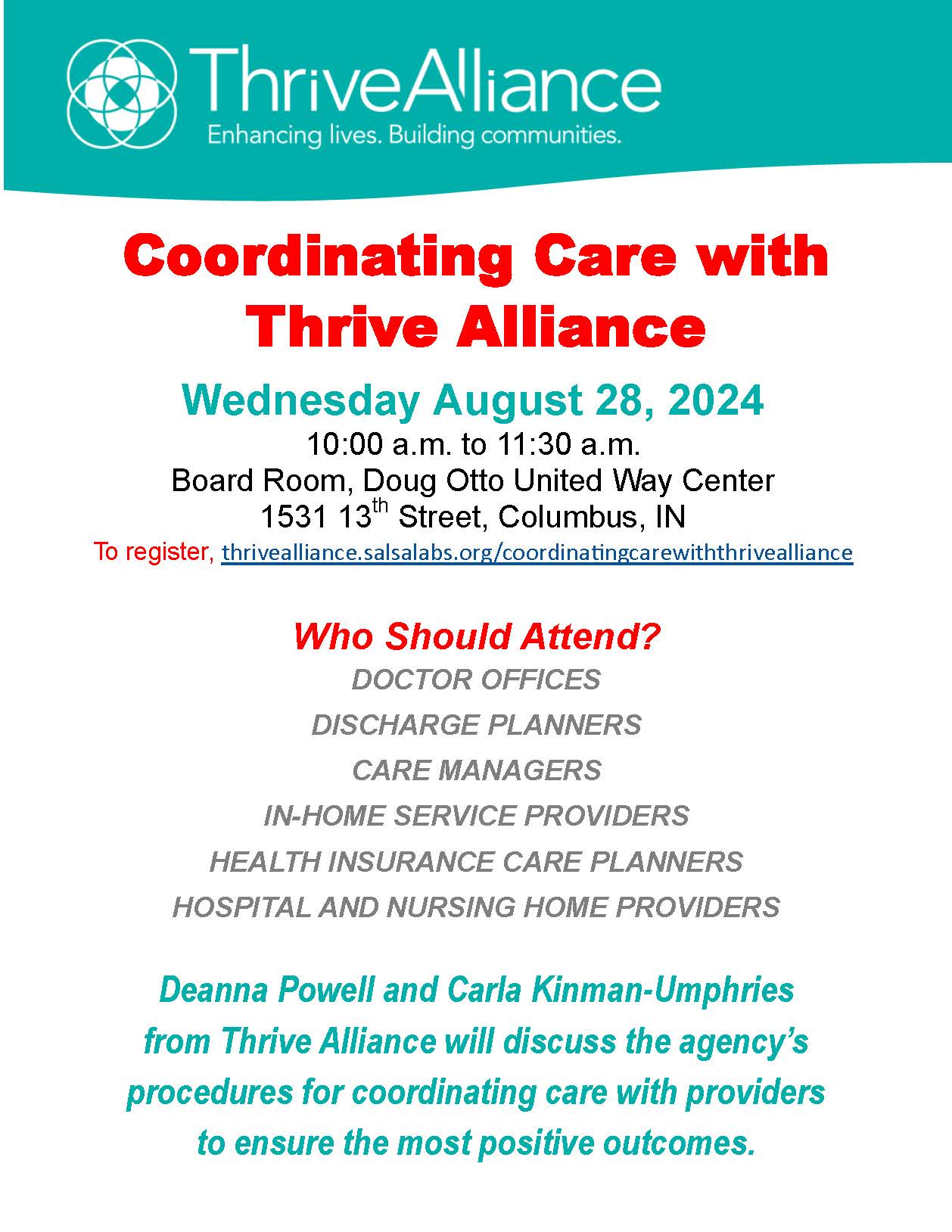
Sign Up for our Cornhole Tourney Fundraiser at The Brick!
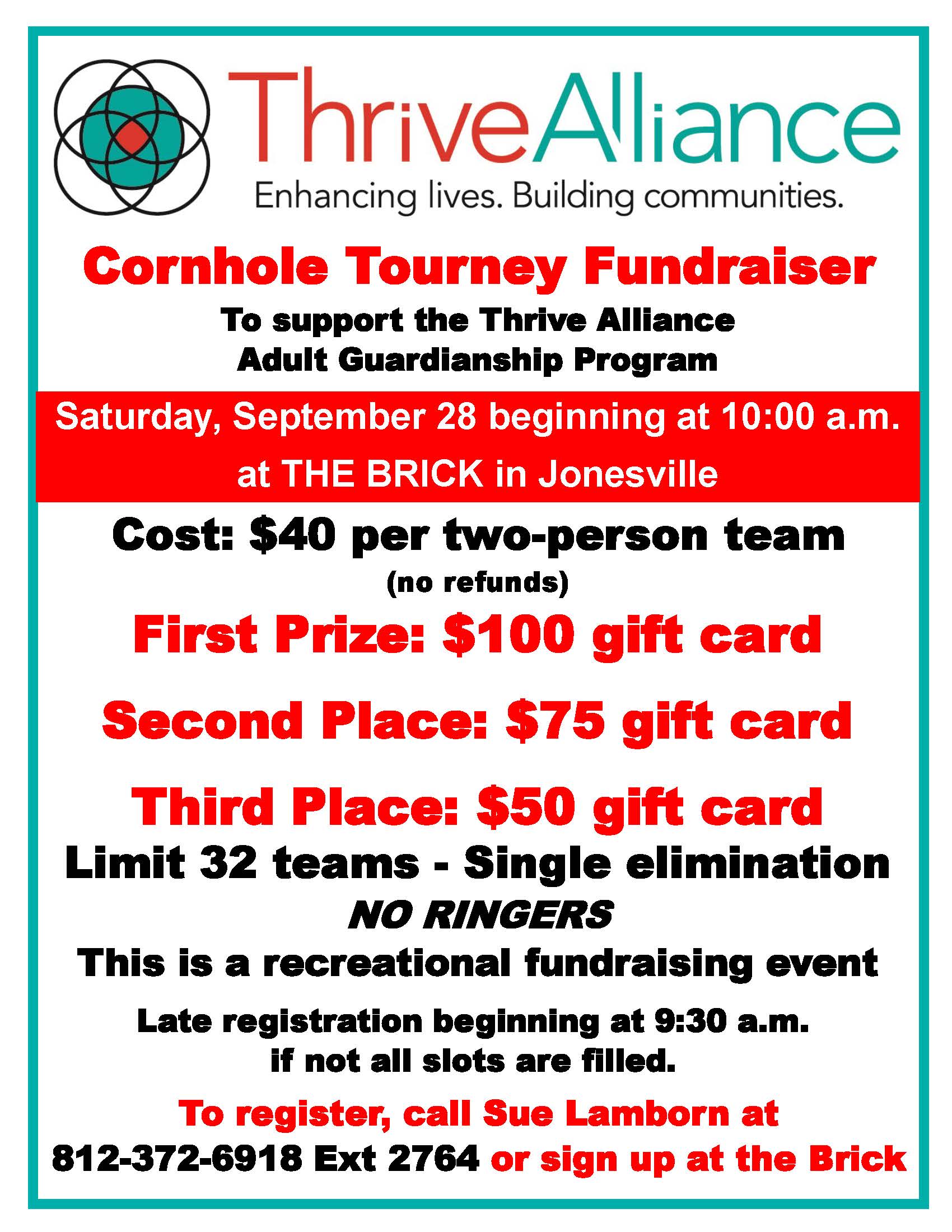
Free caregiver support classes being offered in Seymour by Thrive Alliance
Feeling Stretched as a Caregiver? Powerful Tools for Caregivers is an educational series designed to provide caregivers with the tools they need to take care of those in their care while also taking care of themselves. The program is offered free of charge.
This program helps family caregivers reduce stress, improve self-confidence, better communicate feelings, balance their lives, increase their ability to make tough decisions, and locate helpful resources.
Classes consist of six sessions held once a week. Interactive lessons, discussions and brainstorming help caregivers take the “tools” they choose and put them into action. Participants receive a copy of The Caregiver Helpbook, developed specifically for the class.
Classes will be held every Thursday from 4:30 p.m. to 6:00 p.m., July 25 through August 29, in the Community Room of Crossroads Senior Apartments, 500 South Poplar Street in Seymour.
For more information or to register, contact 812.372.6918 ext. 2403 by July 22.
From The Republic: City moves Haw Creek Meadows project forward
City moves Haw Creek Meadows project forward
City officials approved declaring the location of a potential affordable housing development an economic revitalization area (ERA).
The Columbus City Council voted 7-0 Tuesday to pass the request, the first step towards qualifying for a tax abatement.
Council member Chris Bartels, R-District 1 was absent. Council member Grace Kestler, D-at-large, abstained from the vote because she’s on the Thrive Alliance board.
Housing Partnerships Inc. (HPI), a non-profit that does business as Thrive Alliance, is planning a development called Haw Creek Meadows that would be a combination of workforce family housing and housing for seniors to be built over two phases.
It would be located at the site of the former Columbus Health and Rehabilitation Center at 2100 Midway St. and reserved for those making 30%, 50% and 60% of area median income (AMI), Thrive Alliance officials said.
Next, the council will vote on a confirmatory resolution to make the area an ERA during their meeting on July 16 to officially qualify HPI for a tax abatement.
Phase one would see 64 workforce family housing units with a child care component and phase two would encompass 64 units for seniors.
The child care facility would be open to both residents and non-residents and focused on children up to age 3, Kevin Johnson, executive director of Housing Partnerships at Thrive Alliance, told the redevelopment commission last week. He said they plan to have an agreement in place with a licensed childcare provider who will work in the facility.
The multifamily portion will consist of 20, 30 percent AMI units, 13, 50 percent AMI units and 31, 60 percent AMI units, Johnson said on Tuesday night.
Plans for the development also include a quarter-mile walking trail, a picnic area, a gazebo and a community garden. Johnson added they would also look to add a commercial space for something like a coffee shop “so the seniors would have a reason to come out of their units and break down social isolation.”
The project will likely be up for bids in the second quarter of next year and construction will start by the third quarter, according to Johnson. Build time is expected to take 15 to 18 months with leasing getting started in 2026 and reaching 100 percent occupancy in June of 2027.
Haw Creek Meadows would require demolition of the existing property on site and the construction of a new four-story building — the total project cost for phase one is expected to be $20.6 million, Andrew Lanam of Stifel Public Finance told the redevelopment commission last week.
HPI intends to ask for a 10-year real property tax abatement on a $14.4 million investment, according to city documents. The tax abatement itself would also be voted on during the July 16 meeting.
HPI is applying for an award of 9 percent federal low-income housing tax (LIHT) credits in the amount of $13 million to help with financing of the project, along with about $3.3 million in Regional Economic Acceleration & Development Initiative (READI) funds through the South Central Indiana Housing and Community Development Corporation (SCIHCDC).
The application for LIHT credits will be submitted by the end of this month and are awarded in November, Johnson said on Tuesday night.
Happy Independence Day!

Many thanks to Voelz, Reed and Mount for their support of our mission!


